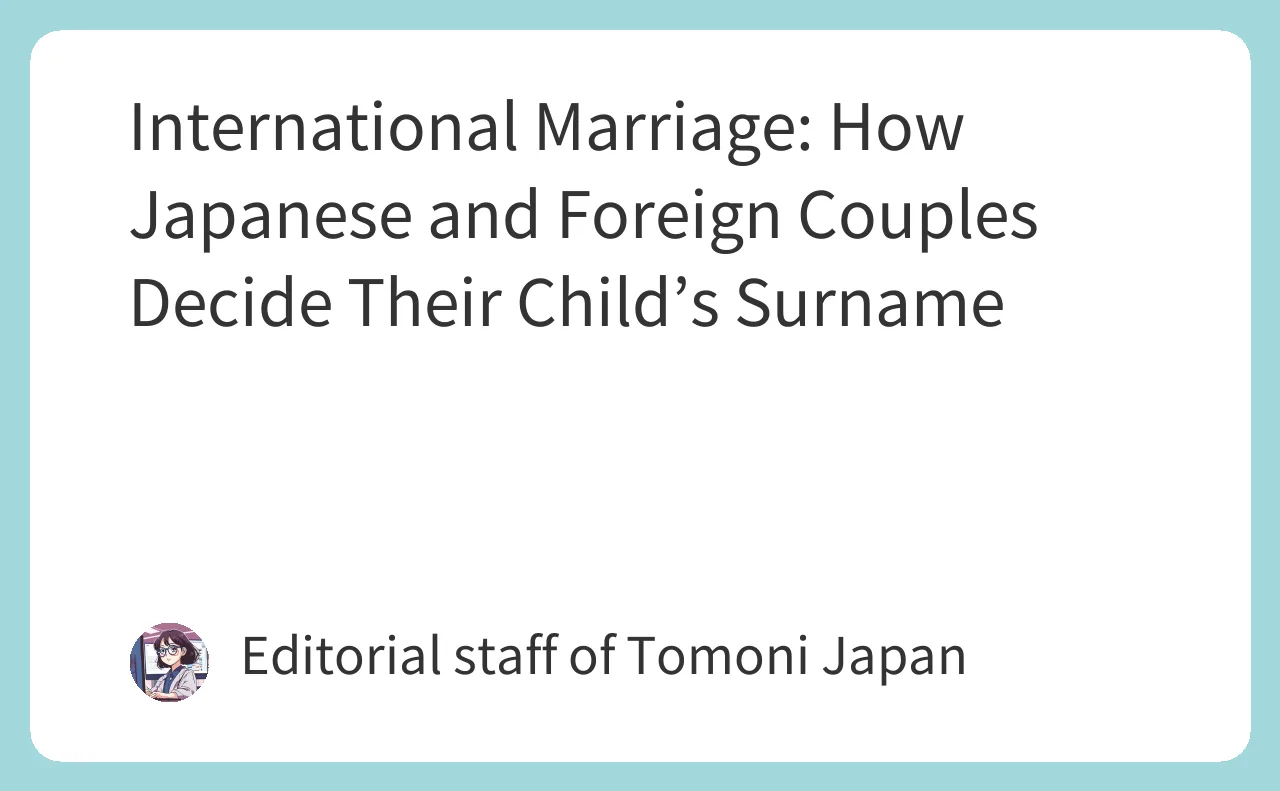International marriages are no longer rare. More Japanese people are marrying foreigners from various countries like the United States, France, or Vietnam. Naturally, one important question arises after marriage: “What surname should our child have?” In this article, we will explore how Japanese and foreign couples can decide their child’s surname step by step.
- Differences in Surname Systems: Japan vs. Other Countries
- General Rule for International Marriages in Japan
- Ways to Decide a Child’s Surname in International Marriages
- 1. Using the Japanese Parent’s Surname
- 2. Using the Foreign Parent’s Surname
- 3. Using a Combined (Hyphenated) Surname
- 4. Dual Nationality and Surname Usage
- Recent Trends: Flexibility and Diversity
- Conclusion
- References
Differences in Surname Systems: Japan vs. Other Countries
Understanding the basic system differences is crucial before deciding.
- Japan: Married couples must choose one common surname under the law (with exceptions for international marriages).
- Other countries: Systems vary widely. For example, the U.S. allows freedom to choose a surname, while Spain often uses a combination of both parents’ surnames.
Because of these fundamental differences, surname decisions can involve some legal steps in international marriages.
General Rule for International Marriages in Japan
When a Japanese citizen marries a foreign national:
- Each spouse can keep their original surname.
- The child’s surname usually follows the Japanese parent’s surname.
However, if desired, parents can go through special procedures to adopt the foreign parent’s surname for the child.
Ways to Decide a Child’s Surname in International Marriages
Here are the main options for Japanese and foreign couples:
1. Using the Japanese Parent’s Surname
This is the simplest and most common way. When reporting a child’s birth in Japan, the child is naturally registered under the Japanese parent’s family registry, adopting their surname.
Example: If Yukari Yamamoto (Japanese) marries John Smith (American), their child would typically carry the surname “Yamamoto.”
Advantage: The procedure is straightforward and fast in Japan.
2. Using the Foreign Parent’s Surname
If the parents prefer the foreign parent’s surname, they can request a change by applying to the family court within three months after the child’s birth.
Example: Their child could take the surname “Smith” after the court approval.
Note: The approval process can be time-consuming and requires careful paperwork.
3. Using a Combined (Hyphenated) Surname
Some parents wish to combine both surnames, like “Yamamoto-Smith.” However, under Japanese law, official documents cannot include hyphens or double surnames.
Still, a combined name can be used informally (nickname or alias) in schools and workplaces.
Key point: The official registered surname must be a single name.
4. Dual Nationality and Surname Usage
Children born from Japanese and foreign parents often hold dual nationality, depending on the countries’ laws. In such cases:
- In Japan: Use the Japanese surname as a Japanese citizen.
- In the foreign country: Use the foreign surname.
However, by age 22, the child must choose one nationality and likely adjust their legal surname accordingly.
Tip: Growing up with two cultures and names can be a rich experience for the child.
Recent Trends: Flexibility and Diversity
With the rising number of international marriages, Japan’s views on children’s surnames are becoming more flexible.
- More parents are choosing surnames freely based on mutual agreement.
- Young couples are less tied to traditional naming rules.
- Schools and communities are increasingly accepting diverse surname styles.
Japan’s legal system is also slowly moving toward simplifying procedures for international families.
Conclusion
In summary, Japanese and foreign couples have several options to decide their child’s surname:
- Use the Japanese parent’s surname.
- Adopt the foreign parent’s surname through a court process.
- Informally use a combined surname in daily life.
- Take advantage of dual nationality and flexible naming.
Since a name is closely tied to identity, it is important for couples to discuss thoroughly and make a thoughtful decision that will make the whole family happy.
References
- Official website of the Ministry of Justice, Japan
- Ministry of Foreign Affairs, Japan – International Marriage Guidelines
- Various embassy websites on nationality and surname regulations

